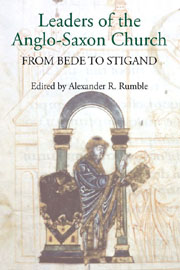Book contents
- Frontmatter
- Contents
- List of Illustrations
- Preface
- Contributors
- Abbreviations
- Introduction: Church Leadership and the Anglo-Saxons
- 1 Bede and the Early English Church
- 2 Archbishop Ecgberht and his Dialogus
- 3 Abbatial Responsibility as Spiritual Labour: Suckling from the Male Breast
- 4 Understanding the Earliest Bishops of Worcester c. 660–860
- 5 The Role of Bishops in Anglo-Saxon Succession Struggles, 955 × 978
- 6 Image-Making: Portraits of Anglo-Saxon Church Leaders
- 7 ‘To Keep Silence Following the Rule's Command’: Bishop Æthelwold, Reforming Ideology and Communication by Signs
- 8 Wulfsige of Sherborne's Reforming Text
- 9 From Winchester to Canterbury: Ælfheah and Stigand – Bishops, Archbishops and Victims
- Index
Preface
Published online by Cambridge University Press: 05 February 2013
- Frontmatter
- Contents
- List of Illustrations
- Preface
- Contributors
- Abbreviations
- Introduction: Church Leadership and the Anglo-Saxons
- 1 Bede and the Early English Church
- 2 Archbishop Ecgberht and his Dialogus
- 3 Abbatial Responsibility as Spiritual Labour: Suckling from the Male Breast
- 4 Understanding the Earliest Bishops of Worcester c. 660–860
- 5 The Role of Bishops in Anglo-Saxon Succession Struggles, 955 × 978
- 6 Image-Making: Portraits of Anglo-Saxon Church Leaders
- 7 ‘To Keep Silence Following the Rule's Command’: Bishop Æthelwold, Reforming Ideology and Communication by Signs
- 8 Wulfsige of Sherborne's Reforming Text
- 9 From Winchester to Canterbury: Ælfheah and Stigand – Bishops, Archbishops and Victims
- Index
Summary
The collection of papers published in this volume seeks to illustrate the important and various roles played by individual leading ecclesiastics in England, both within the church and in the wider political sphere, from the late seventh to the mid eleventh century. Individual chapters discuss not only the undeniable authority of Bede and Bishop Æthelwold but also the influence of less-familiar figures such as Bishop Wulfsige of Sherborne, Archbishop Ecgberht of York and St Leoba. The book draws new conclusions from both textual and material evidence which will demonstrate the influence (by both deed and reputation) of powerful personalities not only on the developing institutions of the English church but also on the secular politics of their time.
As is demonstrated in my introduction, theories of ecclesiastical leadership were expounded in contemporary texts on the role of bishops and heads of monastic houses. But how far did image or ideal reflect reality? Writers of biography have to weigh up the balance between an individual's character, acumen and talents and the norms of institutional training, expectations and duties of those in authority in the church. Which were outstanding, rather than merely doing the same as others of their status? How much room was there for individuals to use their office to promote new ideas?
- Type
- Chapter
- Information
- Leaders of the Anglo-Saxon ChurchFrom Bede to Stigand, pp. ixPublisher: Boydell & BrewerPrint publication year: 2012



